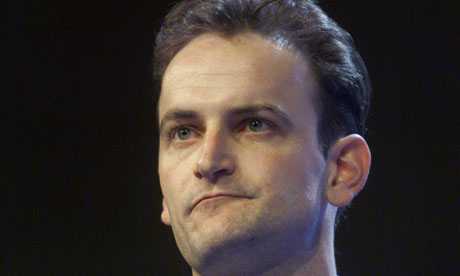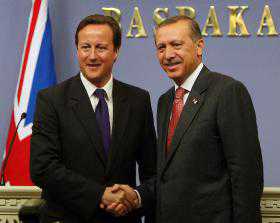By CHRISTOPHER LEAKE
An eight-man SAS team was being held by Libyan rebel forces last night after being captured as they accompanied a junior British diplomat on an undercover mission which ended in embarrassment.
The elite troops had been escorting the diplomat through rebel-held territory in the east of Libya as he tried to make contact with opponents of Colonel Gaddafi.
The diplomat had intended to pave the way for a more senior British official to establish diplomatic relations with rebel forces.

But last night the young Foreign Office employee and his armed SAS escorts were locked up inside a military base in Benghazi, the largest city held by opponents of Col Gaddafi.
More…
- Ex-Met chief profits from £4million deal to train Libyan police… in Huddersfield
- Former nightclub dancer reveals how she had a ‘crazy’ six-year fling with Gaddafi’s son and watched as he blew millions
It is understood the SAS incursion into rebel-held territory infuriated opposition politicians, one of whom told them to warn David Cameron’s Government that it should recognise the opposition as Libya’s legitimate leaders before attempting to open negotiations.
Sources admitted last night that there was huge embarrassment in Whitehall that the SAS mission had backfired.
But there was confidence that the SAS team and the diplomat would be released unharmed within 24 hours after the rebels had made their point. There were no plans last night for a second SAS team to be sent in to secure the release of their colleagues.
www.dailymail.co.uk, 6th March 2011
SAS unit, diplomat ‘held’ by Libya rebels
(AFP) – 6 March 2011
LONDON — A Special Air Service (SAS) unit and a junior diplomat were being held by rebels in eastern Libya following a bungled mission to put the envoy in touch with them, The Sunday Times said.
The broadsheet, citing sources, said the SAS unit, thought to be up to eight men, were captured along with the diplomat they were escorting through the rebel-held east.
“We can neither confirm nor deny the report,” a Foreign Office spokeswoman told AFP.
The Ministry of Defence (MoD) said: “We neither confirm nor deny the story and we do not comment on the special forces.”
The uninvited appearance of the SAS alongside the diplomat “angered Libyan opposition figures who ordered the soldiers to be locked up in a military base,” the weekly said.
Opponents of Libyan leader Moamer Kadhafi “fear he could use any evidence of Western military interference to rally patriotic support for his regime,” it said.
The newspaper said that according to Libyan sources, the SAS soldiers were taken by rebels to Libya’s second city Benghazi, held by the opposition, and hauled up before a senior figure.
The Sunday Times said a British source, who confirmed the men had been detained, said the diplomat they were protecting had wanted to make contact with the rebels.
It cited a source close to the opposition leadership as saying rebel officials were worried that Libyan people might think from the escort party that “foreign troops have started to interfere by landing in Libya”.
British service personnel have already been involved in the rescue of British nationals working on oil installations in remote desert camps.
The MoD said Saturday that about 200 troops had been placed on standby to help with evacuation and humanitarian operations in Libya.
The troops from the Black Watch, 3rd Battalion The Royal Regiment of Scotland, are ready for deployment at 24 hours’ notice, a spokeswoman said.
A YouGov poll of 2,413 adults conducted on Thursday and Friday for The Sunday Times found low support for using troops in Libya.
It found that 69 percent supported economic sanctions on the Kadhafi regime and 56 percent favoured the imposition of a no-fly zone.
However, only 12 percent backed providing arms to rebel forces and 11 percent agreed with sending in allied troops.
Some 48 percent thought Prime Minister David Cameron has handled the Libyan uprising badly and 32 percent said he had handled it well.
—
SAS unit ‘held by Libyan rebels’
Defence secretary Liam Fox has confirmed that a British diplomatic team is in Libya talking to rebel forces.
But he declined to comment on reports that the SAS unit guarding the team had been detained by forces opposed to Colonel Muammar Gaddafi.
Interviewed on the BBC’s Andrew Marr Show, Dr Fox said there was a “small diplomatic team” in the eastern city of Benghazi.
“We are in touch with them but it would be inappropriate for me to comment further on that for reasons I am sure you will understand,” he added.
Asked if the UK team was in danger, Dr Fox replied: “We are in touch with them but I’m not going to be giving further comment on that.”
He added: “It is a very difficult situation to be able to understand in detail. There are a number of different opposition groups to Colonel Gaddafi in Libya who do seem relatively disparate. We want to clearly understand what the dynamic is here because we want to be able to work with them to ensure the demise of the Gaddafi regime, to see a transition to greater stability in Libya and ultimately to more representative government.
“So getting a picture of that is relatively difficult as is widely reported. Communications are being interrupted, there are difficulties with mobile phones, with the internet potentially being interfered with.”
According to the Sunday Times, up to eight British soldiers are believed to have been captured as they escorted the diplomatic mission through rebel-held territory in the east of the country.
The mission is thought to have been an initial attempt to contact Gaddafi’s opponents ahead of a visit by a senior colleague to establish diplomatic relations, but the SAS intervention apparently angered the rebels.
The situation came to light as the battle for control of the country continued to rage and fears grew over the impact of instability in the region on oil prices.
London Evening Standard, 6 Mar 2011





